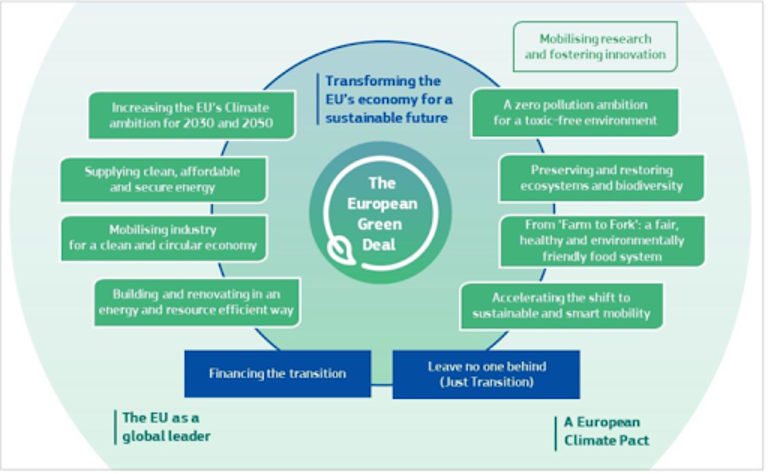Edition #1 – For internal use only
The European Green Deal
The European Commission has published guidelines that set out a roadmap for the European Green Deal. Here are some of the key points.

The European Commission published communication guidelines setting out the 'European Green Deal' on December 11 2019. Its intention is to serve as a roadmap which resets the Commission’s commitment to tackling climate and environment-related challenges.
The European Green Deal presented at the end of 2019 by the Commission President Von der Leyen is a clear roadmap for the European continent to secure commitments on climate action. Its aim is to transit towards a clean, circular economy and to stop climate change, reduce biodiversity losses and cut emissions and pollution.
Europe’s new growth strategy consists of Climate Law, Just Transition Mechanism and a new industrial policy strategy that will support the umbrella objective to achieve net-zero emissions and be the first climate-neutral continent by 2050. It will cut emissions and slow down global warming and will also be a driver of new economic opportunities. This promising development will make the European Union's economy more resilient to climate and environment-related risks in the future.
Several of the 50 policy measures are intended to be released in the first and second semester of 2020. Here are some key ones:
-
The first European ‘Climate Law’ will enshrine the 2050 climate neutrality objective in legislation and will ensure that all EU policies contribute to the climate neutrality objective and that all sectors play their part.
-
Circular Economy Action Plan will help modernize the European Union’s economy alongside the Industrial Strategy. It will prioritize reducing and reusing materials before recycling, foster new business models and set minimum requirements to prevent environmentally harmful products from being placed on the European market.
-
The carbon border mechanism will propose a new tariff that will be applied on products made in countries with laxer climate policies and looser emission controls. This will ensure that the price of imports reflect their carbon content more accurately. This measure will be designed to comply with the World Trade Organization rules and other international obligations of the EU.
-
Policy on trade agreements will be based on the Paris Agreement as the essential element for all future comprehensive trade agreements. The policy will prevent taking on trade agreements with nations that have not signed the Paris Climate Agreement.
The European Green Deal covers all sectors of the economy. All European Union activity and approaches are required to be in line with and contribute to the European Green Deal goals.
There is also emphasis being placed on the environmental ambition of the Green Deal. This ambition will not be achieved by Europe acting alone, since the drivers of climate change are global and are not limited by national borders. According to the deal, the European Union can use its influence, expertise and financial resources to mobilize its neighbors and partners.
However, the Green Deal is currently facing delays due to the COVID-19 crisis. Some of the priorities that were supposed to be adopted before the end of March, such as the Climate Law, are likely to be rescheduled and delayed by several weeks. Yet, Vivian Loonela, the European Union Commission spokesperson for the European Green Deal, recently stated that “the long-term work on the Green Deal continues in parallel” to the coronavirus firefighting “and continues to be one of the priorities as well.”
The household appliance industry’s commitment to achieving the EU’s decarbonization goals remains, however, Home Appliance Europe (APPLiA) is calling on the European Commission for extraordinary measures to help the sector cope with the unprecedented situation generated by the outbreak of COVID-19. Dr. Peter Götz, APPLiA’s President stated that “the health response to this unprecedented situation is indisputably a priority for us all.” He added that “to preserve the continuation and the future of the home appliance industry in Europe, key legal requirements need to be alleviated now.”


 EN
EN  TR
TR 

Share